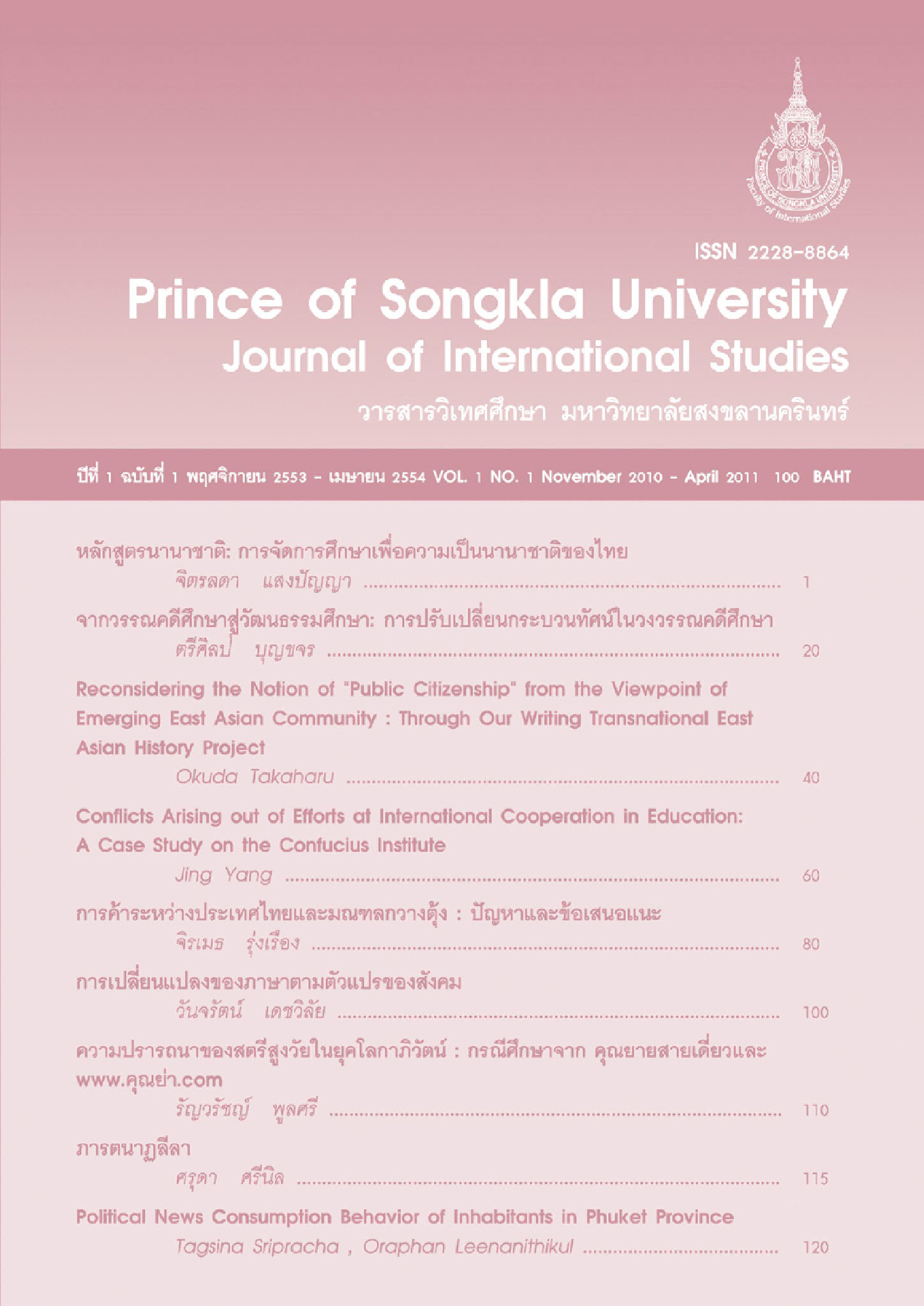The effect of social variables on language shifts
Main Article Content
Abstract
This article analyzes the relationship between linguistic variables and social variables in order to determine which social factors affect language change. It also considers and responds to issues raised in previous studies on whether language shifts are a result of social variables. Social variables are important factors involved in language shifts. There are variations according to a speaker's age, gender, stratification, and ethnicity. Social contexts such as the relationship between speakers and listeners, circumstances, topics, purpose, communicative ways, and culture, also play an important role in language change. It can be seen that language can be shifted from one to another. Thus, the phenomenon of language shifts can be explained by considering social contexts which reflect the changes in society. Within this context, the language users themselves must understand the nature of language and recognize their language roles in order to prevent a loss or even extinction of their own language. Therefore, understanding the nature of language can be an effective way to preserve one's native language.
Article Details
Statements and opinions expressed in articles herein are those of the authors and do not necessarily reflect the position of the editors or publisher.
Article, information, text, image, etc. which are published in Journal of International Studies, belong to Journal of International Studies. If anybody or any organization would like to use part or whole of them, they must receive written permission from Journal of International Studies before usage.
References
ปนัดดา เลอเลิศยุติธรรม. (2549), ความสุภาพที่ปรากฏในวัจนกรรมการขอร้อง ใน กฤษดาวรรณ หงศ์ลดารมภ์ และจันทิมา เอียมานนท์, (บรรณาธิการ), พลวัตของภาษาไทยปัจจุบัน (หน้า263-284),กรุงเทพ ฯ : จุฬาลงกรณ์มหาวิทยาลัย
พจนานุกรมฉบับราชบัณฑิตยสถาน พ.ศ. 2542. (2546). กรุงเทพฯ : นานมีบุ๊คพับลิเคชัน
พลวัฒ ประพัฒน์ทอง. (ม.ป.ป.). พลวัตทางวัฒนธรรมของชาวจีนยูนนานในประเทศไทย : การทบทวนองค์ความรู้ทางสังคมศาสตร์. (ออนไลน์). เข้าถึงได้จาก : http://museum.mfu.ac.th/download-pdf/chineseinthai.pdf (วันที่ค้นข้อมูล : 28 สิงหาคม 2553)
พิณทิพย์ ทวยเจริญ. (2547). ภาพรวมของการศึกษาสัทศาสตร์และภาษาศาสตร์, พิมพ์ครั้งที่ 3. กรุงเทพฯ : มหาวิทยาลัยธรรมศาสตร์
ภาสพงศ์ ผิวพอใช้. (2549). การตอบรับคําขอโทษของผู้พูดที่มีสถานภาพทางสังคมต่างกันในภาษาไทย ใน กฤษดาวรรณ หงศ์ลดารมภ์ และจันทิมา เอียมานนท์, บรรณาธิการ). พลวัตของภาษาไทยปัจจุบัน (หน้า83-107) กรุงเทพ ฯ : จุฬาลงกรณ์มหาวิทยาลัย
เมชม สอดส่องกฤษ. (2550), การใช้คําเรียกขานในภาษาไทยและภาษาจีนในสมัยปัจจุบัน : การศึกษาเปรียบเทียบ (ออนไลน์). เข้าถึงได้จาก : http://metchs.blogspot.com/2010/03/ นse-of-address-terms-in-modern-thai-and.html (วันที่ค้นข้อมูล : 25 สิงหาคม 2553)
วันจรัตน์ เดชวิลัย และทวนธง ครุฑจ้อน. (2550), แนวโน้มการเลิกใช้คํายืมภาษาจีนฮกเกี้ยน ในจังหวัดภูเก็ต รายงานการวิจัย), ภูเก็ต : สงขลานครินทร์วิทยาเขตภูเก็ต
ศรีศักร วัลลิโภดม สังคมวัฒนธรรมไทย สารานุกรมไทยสําหรับเยาวชน ฯ เล่มที่ 16.(ออนไลน์) เข้าถึงได้จาก http://encyclopedia/ สังคมและวัฒนธรรมไทย / #ref (วันที่ค้นข้อมูล : 30 กันยายน 2553).
ศุภมาส เอ่งฉ้วน. (2537) คําเรียกญาติภาษาจีนฮกเกี้ยนในภาคใต้ของประเทศไทย และเกาะปีนัง วิทยานิพนธ์อักษรศาสตรมหาบัณฑิต.กรุงเทพ ฯ : จุฬาลงกรณ์มหาวิทยาลัย
อภิวัฒน์ คุ้มภัย. (2549, มิถุนายน - พฤศจิกายน) การเปลี่ยนแปลงทางความหมายของคําในภาษาจีน วารสารอักษรศาสตร์, 27 (1), หน้าที่ 7-26.
อนงค์นาฏ บุญแก้ววรรณ. (2545). วิเคราะห์การใช้ศัพท์และการแปรของภาษาไทยถิ่นใต้ในบุคคล สามระดับอายุ : ศึกษาเฉพาะกรณีเขตพื้นที่ลุ่มแม่น้ําปากพนัง จังหวัดนครศรีธรรมราช วิทยานิพนธ์การศึกษามหาบัณฑิต. สงขลา : มหาวิทยาลัยทักษิณ
อมรา พงศาพิชญ์. (2541) ชาติพันธุ์ใน สารานุกรมไทยสําหรับเยาวชนฯ เล่มที่ 23 (ออนไลน์) เข้าถึงได้จาก http://guru.sanook.com/encyclopedia/ (วันที่ค้นข้อมูล : 25 สิงหาคม 2553)
อมรา ประสิทธิ์รัฐสินธุ์, (2544). ภาษาศาสตร์สังคม (sociolinguistics) พิมพ์ครั้งที่3. กรุงเทพฯ : โรงพิมพ์จุฬาลงกรณ์มหาวิทยาลัย
อมรา ประสิทธิ์รัฐสินธุ์. (2548) ภาษาในสังคมไทย ความหลากหลาย การเปลี่ยนแปลง การพัฒนา พิมพ์ครั้งที่ 4. กรุงเทพ ฯ : โรงพิมพ์จุฬาลงกรณ์มหาวิทยาลัย
อมรา ประสิทธิ์รัฐสินธุ์. (2549), พินิจไทย ไตรภาค ปฐมภาคะภาษา. กรุงเทพ ฯ : สถาบันไทยศึกษา จุฬาลงกรณ์มหาวิทยาลัย
อุดม วโรตม์สิกขดิตถ์. (2551).กึ่งศตวรรษการวิจัยภาษาไทยตามแนวทฤษฎีภาษาศาสตร์ ในการ สัมมนาเอกลักษณ์ภาษาไทย : กึ่งศตวรรษการวิจัยภาษาไทยตามแนวทฤษฎีภาษาศาสตร์(หน้า8). กรุงเทพมหานคร : ภาควิชาภาษาศาสตร์ จุฬาลงกรณ์มหาวิทยาลัย


